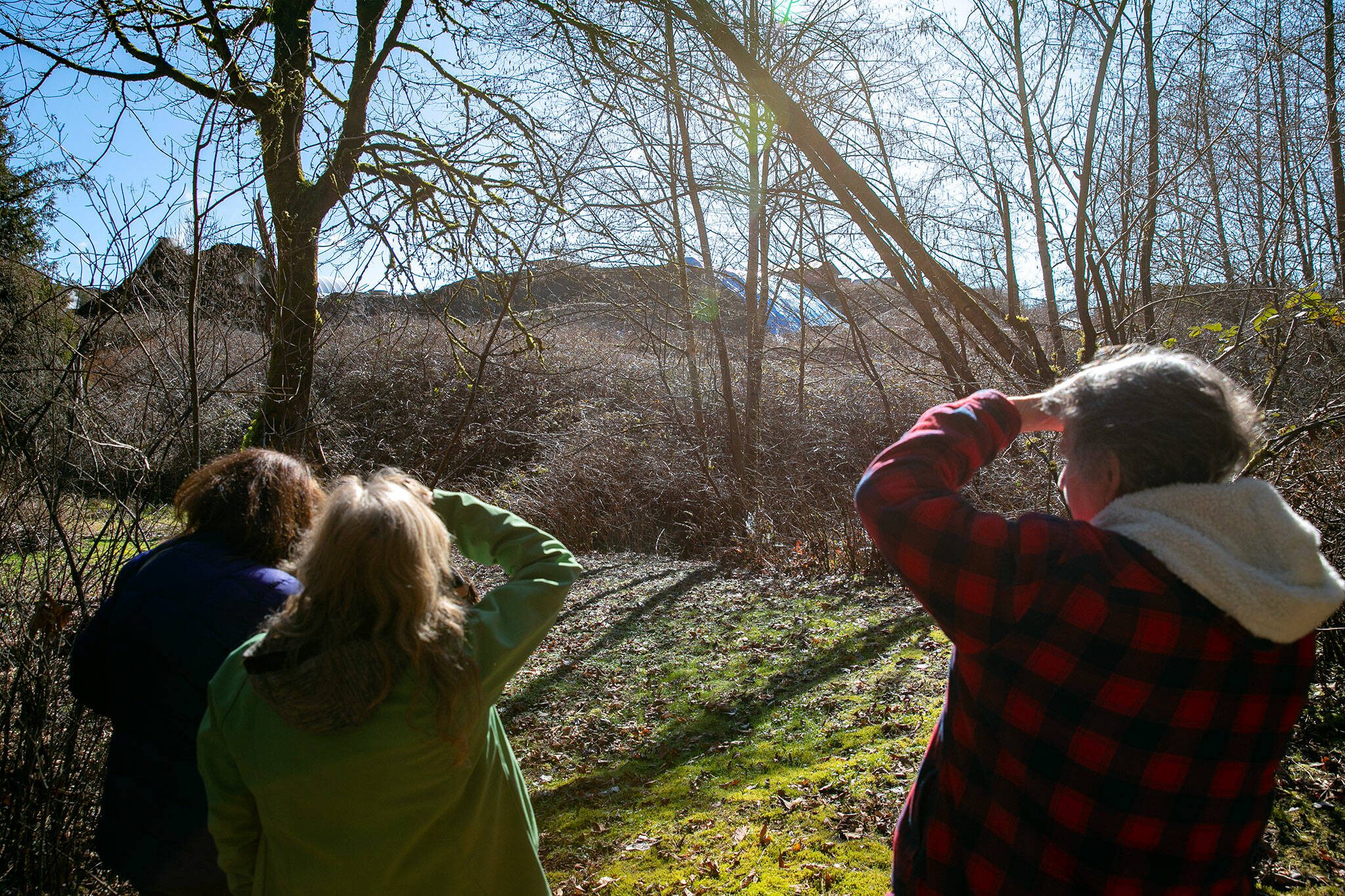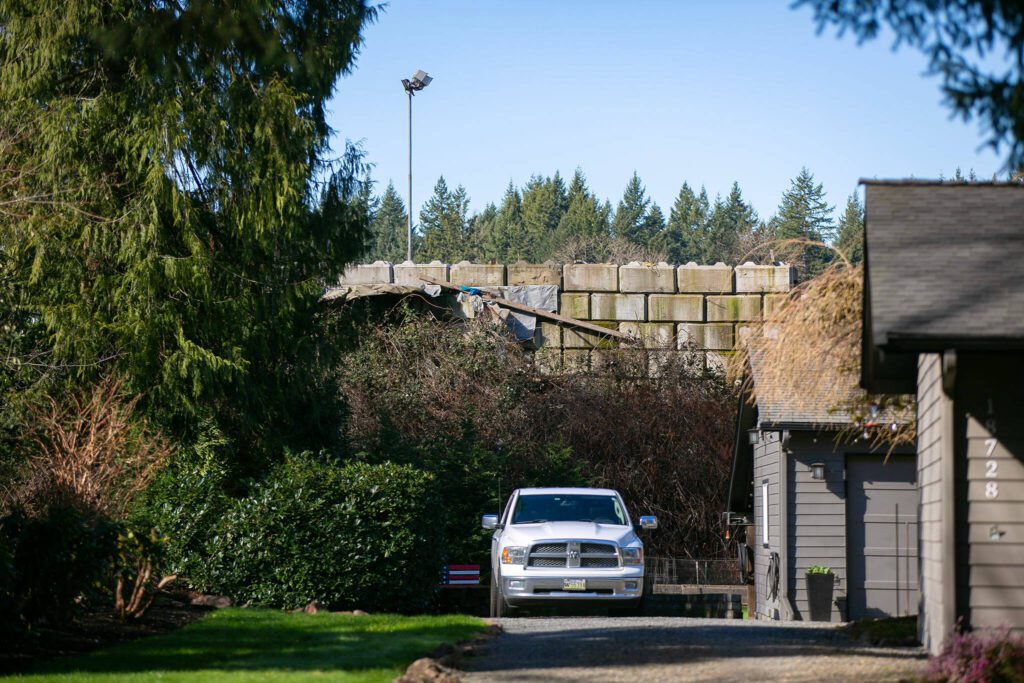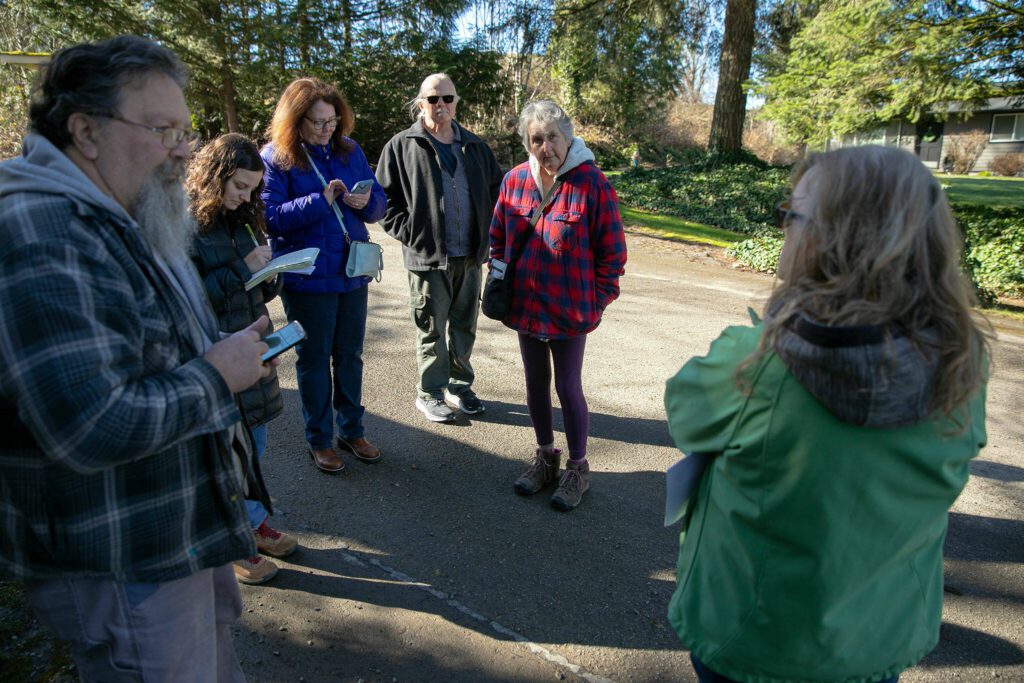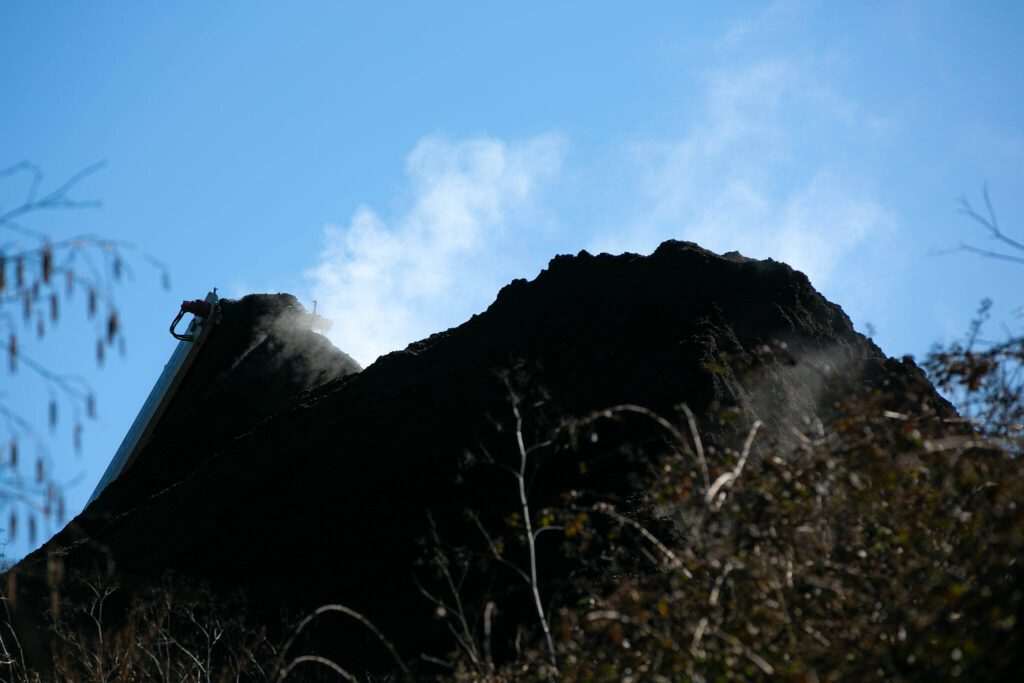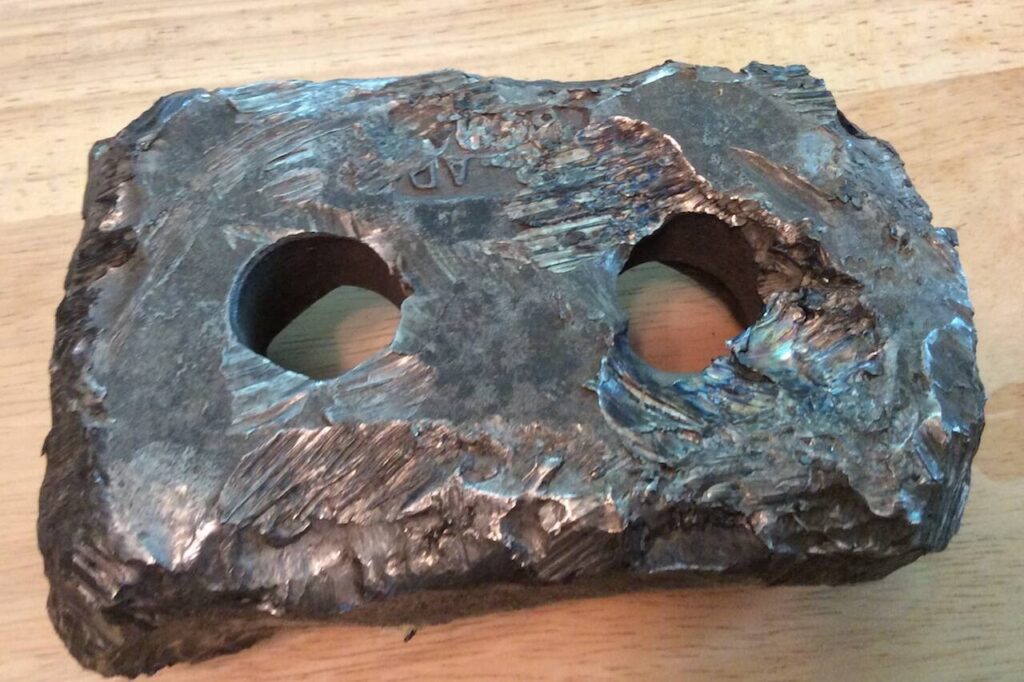SNOHOMISH — Lisa Jansson and her family moved to 5 acres in rural southern Snohomish County in 1999, in search of a more peaceful life in the countryside near Maltby.
She and her husband enjoyed gardening and had a “Noah’s ark” array of animals: goats, pigs and chickens among them.
But since January 2023, a DTG Recycle facility adjacent to their property has made life anything but peaceful. Atop a 30- to 50-foot tall berm, tub grinders chop up woody debris, echoing throughout the neighborhood.
“I don’t hear birds anymore,” Jansson said. “I hear grinding.”
Last month, water flowing along the edge of Jansson’s yard — typically clear and blue — turned brown and foamy, emanating a smell that could be delicately described as “septic-like.” Jansson reported the situation to the Snohomish County Health Department.
Staff visited Jansson’s property, but didn’t take samples during their first trip.
Jansson and fellow neighbor Patti Olsen decided to take their own sample and submit it to a lab. It showed high levels of fecal coliform and E. coli, according to results from AM Test Laboratories. The fecal coliform, at 28,000 colony-forming units per 100 milliliters of water, was 140 times greater than levels allowed at a swimming beach.
Snohomish County has issued notices of violation against DTG’s site at 18827 Yew Way, regarding unpermitted buildings and land-disturbing activity. Still, DTG’s operations have continued, leaving neighbors to try to hold the company accountable.
Residents, who have spent years dealing with the company, see recurring themes at DTG facilities around the state.
For months, neighbors have filed noise complaints to Snohomish County Planning and Development Services and contacted county leaders about DTG workers using equipment outside of operating hours.
Olsen, who lives less than a mile away with her husband Mel, said the DTG facility “turned our dream into a nightmare.”
‘They’re not recycling’
DTG Recycle offers recycling to commercial, industrial and construction clients. The company has a slew of recycling sites in Western Washington, as well as a landfill in Yakima.
Over a year ago, DTG acquired United Recycling’s facility — and inherited the history of violations at the “Snohomish site,” just northeast of Maltby.
In 2022, Snohomish County Planning and Development Services found United Recycling in violation of constructing and occupying buildings without proper permits. United Recycling appealed the violations, arguing the company sought permits from the county in the past, but their requests were refused.
When DTG took over in 2023, the company accepted the violations that workers constructed and occupied buildings without following county protocol. But DTG disputed the county’s allegations that operations at the Yew Way site are not allowed in an R-5 zone, or a “rural 5-acre” area.
Last month, the county hearing examiner heard DTG’s appeal and is expected to release a decision around April 20, wrote county Planning and Development Services spokesperson, Jacob Lambert, in an email.
Representatives of DTG declined to comment on the case.
Whenever possible, county staff try to work with businesses to help them align with county code — allowing companies to continue operations while they apply for proper permits. County code enforcement allowed work to continue at Mountain Loop Mine’s Everett Aggregate Yard for months without proper permits, despite concerns from neighboring Fairmount Elementary School that made headlines.
Jansson also experienced issues with the facility next to their yard when United Recycling owned the property.
Once, in 2016, a scalding hot 5-inch metal piece of equipment broke off a tub grinder and flew into Jansson’s yard — 20 feet away from their sons, who were fixing up a car in the driveway. A year later, an almost identical piece of metal landed in their driveway again, though no one was home.
“It was my example of how close we were to the machinery,” Jansson said.
Nothing like that has happened since DTG took over, but the noise has become more of a nuisance, she said.
Snohomish County also found DTG in violation of county code in 2021 at the company’s Woodinville reclamation site, where recyclable and non-recyclable materials are separated at 8624 219th Street SE, about 3 miles south of the Yew Way site.
At the Woodinville site, DTG workers are required to bring non-recyclable materials to Snohomish County’s solid waste facility and pay a “tip fee” for disposing the items.
But in spring 2021, Snohomish County officials tailed a DTG truck from the Woodinville site and witnessed the driver dump its contents at the company’s landfill in Yakima, in an apparent attempt to avoid paying Snohomish County’s tip fee.
On Nov. 10, 2021, the Snohomish County Hearing Examiner issued DTG a $1,500 fine — a small price when the company pays millions to dump residual reclamation waste, or non-recyclable waste, through Snohomish County Solid Waste Management.
In 2023, DTG disposed of over 146,000 tons of waste in Snohomish County, costing them over $10 million, according to a summary of the county’s annual residual reclamation waste. As a comparison, Cedar Grove’s Snohomish County facilities had slightly over 3,000 tons of waste last year.
During the first three months of this year, DTG has disposed of almost 30,000 tons of waste. So far in 2024, Cedar Grove and DTG are the only two reclamation facilities that have brought waste to Snohomish County Solid Waste Management.
“It has ‘recycle’ in the name, but they’re not recycling,” said Anita Gallagher, a private consultant who has been investigating DTG’s operations in Western Washington.
‘The watchdogs’
Locals who live near DTG’s landfill in Yakima see many parallels in their experience.
In 2019, DTG purchased the “limited purpose” landfill at 41 Rocky Top Road, where staff dispose of demolition and construction waste.
Neighbors reported concerns in the following years about chemical smells, litter and noise that came from the site, worried about their health and quality of life, as reported by Northwest Public Broadcasting.
Locals formed the grassroots organization Friends of Rocky Top in an effort to hold DTG accountable for air, land and water pollution coming from the site.
“It’s a heavy lift,” said Nancy Lust, a Yakima resident and a member of Friends of Rocky Top.
Residents took it upon themselves to file complaints and encouraged others to do so as well.
And last summer, DTG closed the landfill and the Yakima Health District didn’t renew the company’s operating permit for the property. The state Department of Ecology also deemed the landfill a cleanup site last year after detecting air pollution at the site.
After seeing news coverage on the Yakima landfill, Olsen connected with Scott Cave, a consultant for Friends of Rocky Top. Last month, Lust and Cave went to Snohomish to check out the DTG facility and speak with neighbors.
“I don’t know if the public is aware of how much responsibility is placed on the homeowners who live adjacent to these facilities,” said Cave. “They’re the watchdogs.”
This week, DTG and county Surface Water Management staff visited Jansson’s property. Both parties took samples of the polluted ditch water in her yard.
DTG staff didn’t have any theories on where the water was coming from, Jansson said.
“They seem very anxious to to do whatever they need to do to fix it,” she said.
During last month’s hearing, neighbors aired concerns about noise. DTG agreed to pile wood debris between heavy machinery and residents’ yards.
Jansson said workers appeared to deliver on that compromise this week, as the noise from the site seemed less loud.
“It seems like they are trying to fix some things,” she said. “I kind of want to give them a chance to make things right.”
Ta’Leah Van Sistine: 425-339-3460; taleah.vansistine@heraldnet.com; Twitter: @TaLeahRoseV.
Talk to us
> Give us your news tips.
> Send us a letter to the editor.
> More Herald contact information.
